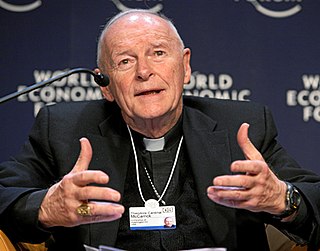A Quote by Brennan Manning
The forgiveness of God is gratuitous liberation from guilt. Paradoxically, the conviction of personal sinfulness becomes the occasion of encounter with the merciful love of the redeeming God. "There will be more rejoicing in heaven over one sinner repenting..." (Luke 15:7). In his brokenness, the repentant prodigal knew an intimacy with his father that his sinless, self-righteous brother would never know.
Related Quotes
... whenever Christ, the Bridegroom of pure souls, is mystically united with each soul, He gives the Father occasion to rejoice over this as at a wedding. It is Christ Himself Who says, 'Joy shall be in heaven over one sinner who repents' (Lk. 15:7). For joy, according to the Apostle, is the fruit of the Holy Spirit (Gal. 5:22), Who through conversion brings back to Christ those living in repentance, and reunites them with Him. And this joy embraces both those in heaven and godly men on earth. That is why there is joy in heaven over one repentant sinner.
Our God is a God of love. He waits with open arms, and the unfolding of His merciful plan of salvation is not only therefore the mark of divine power but also the mark of God's relentless, redeeming love. It is a point well worth pondering because, among other reasons, it will help us to understand better why God, through the prophets, denounces sin and corruption in such scalding terms. He loves all of us, His spirit sons and daughters, but hates our vices. His denunciation of those vices may, if we are not careful, seem to obscure the enormous and perfect love He has for us.
To judge sins is the business of one who is sinless, but who is sinless except God? Who ever thinks about the multitude of his own sins in his heart never wants to make the sins of others a topic of conversation. To judge a man who has gone astray is a sign of pride, and God resists the proud. On the other hand, one who every hour prepares himself to give answer for his own sins will not quickly lift up his head to examine the mistakes of others.
The psychoanalysis of individual human beings, however, teaches us with quite special insistence that the god of each of them is formed in the likeness of his father, that his personal relation to God depends on his relation to his father in the flesh and oscillates and changes along with that relation, and that at bottom God is nothing other than an exalted father.
Therefore, is thy brother a sinner? Then cover his sin and pray for him. Dost thou publish his sins, then truly thou art not a child of your merciful Father; for otherwise thou wouldst be also as he, merciful. It is certainly true that we cannot show as great mercy to our neighbor, as God has to us; but it is the true work of the devil that we do the very opposite of mercy, which is a sure sign that there is not a grain of mercy in us.
God, Who is by nature good and dispassionate, loves all men equally as His handiwork. But He glorifies the virtuous man because in his will he is united to God. At the same time, in His goodness he is merciful to the sinner and by chastising him in this life brings him back to the path of virtue. Similarly, a man of good and dispassionate judgment also loves all men equally. He loves the virtuous man because of his nature and the probity of his intention; and he loves the sinner, too, because of his nature and because in his compassion he pities him for foolishly stumbling in darkness.
As God adds his 'Yes' to your 'Yes,' as he confirms your will with his will, and as he allows you, and approves of, your triumph and rejoicing and pride, he makes you at the same time instruments of his will and purpose both for yourselves and for others. In his unfathomable condescension God does add his 'Yes' to yours; but by doing so, he creates out of your love something quite new - the holy estate of matrimony.
If it were not for the Eucharist, if it were not for this marvelous manifestation of God's love, if it were not for this opportunity to place ourselves in the very real presence of God, if it were not for the sacrament that reminds us of His love, His suffering and His triumph, which indeed perpetuates for us His saving sacrifice on the cross, I am sure that I could never face the challenges of my life, my own weakness and sinfulness and my own need to reach out to the Living God.
As Christ's ministry drew to its close, its severity and its gentleness both increased; its severity to the class from whom it never turned away. Side by side through all His manifestations of Himself, there were the two aspects: "He showed Himself froward " (if I may quote the word) to the self-righteous and the Pharisee; and He bent with more than a woman's tenderness of 'yearning love over the darkness and sinfulness, which in its great darkness dimly knew itself blind, and in its sinfulness stretched out a lame hand of faith, and groped after a Divine deliverer.
God is never a God of discouragement. When you have a discouraging spirit or train of thought in your mind, you can be sure it is not from God. He sometimes brings pain to his children-conviction over sin, or repentance over fallenness, or challenges that scare us, or visions of his holiness that overwhelm us. But God never brings discouragement.
'Go to My brethren, and say unto them, I ascend unto My Father, and your Father, and to My God, and your God' (Jn. 20:!7). He is our Father by grace through the Spirit of adoption (Rom. 8:15), but His Father by nature on account of His divinity. Similarly, He is our God as the creator of our human nature, but His God by reason of the dispensation whereby He became man. He made these distinctions so that we might understand the difference.
In the present age, man proves his separation from his Creator by his spirit of self-sufficienc y and positive rejection of God. The present issue between God and man is one of whether man will accept God's estimate of him, abandon his hopeless self-struggle, and cast himself only on God who alone is sufficient to accomplish his needed transformation.
God never gives dominion to any creature which has not received his image. His image is love. Other things belong to God; but God is love. No creature that has not love will be allowed to have a permanent empire. The Father of mercy will not put the reigns of government into a hand that has no heart. Dominion is a very solemn thing; it may oppress, crush, destroy. The Father must have a guarantee for its gentleness. What guarantee can there be but his image - the possession of a nature tender as the Divine?


































